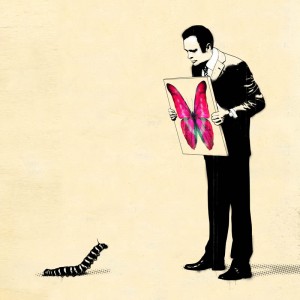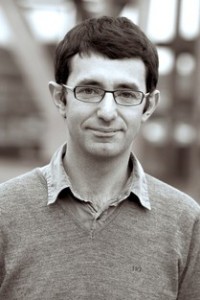
Date and time: 25th November 2013, at 11.00
Location: Carlos Santamaria Building, Room B14.
Speaker: Mike Beaton
Title: Learning and Understanding
Abstract:There is a certain Kantian conception of perceptual experience on which experience can only present those aspects of the world which we already understand (for example, can only present trees qua trees if we understand what a tree is). McDowell has famously argued that it is only by accepting this Kantian conception that we can allow for a highly desirable kind of openness to the world, such that objects in the world can be genuine reasons for our beliefs and actions. Unfortunately this same Kantian conception appears to rule out another very desirable kind of openness: openness to that which we do not yet understand. In this paper, I argue that this problem is only apparent. Even if experience can only present that which we understand, nevertheless we can already understand – from within such a framework, as it were – that the world is not behaving consistently with our expectations. This indicates that something new is required. In any normal case, this lack of coherence with our expectations will never be total, thus we can map out the extent of our lack of understanding. The ‘shape’ of our lack of understanding (which we find by exploring the world) can guide us. In all this, past experience can only ever be a partial guide: luck (in more reductive terms, random exploration) is required, as well as judgment. Using both luck and judgment, we may arrive at some new candidate framework of understanding. At this point no more luck is required, good judgment alone (applied as we interact with the world) can tell us whether or not a new candidate framework is better for our purposes than our old framework. This way of describing things pulls apart what is in reality a fluid process, but nevertheless points to key features of that process. The transitions made in such a process are genuinely rational: they are made by the perceiver, for the perceiver’s own reasons. Thus, it is concluded, we do not need to step outside the framework of practical, engaged rationality in order to analyse perceptual openness to aspects of the world which a perceiver has not yet understood.
Date and time: 25th November 2013, at 11.00
Location: Carlos Santamaria Building, Room B14.
Speaker: Mike Beaton
Title: Learning and Understanding
Abstract:There is a certain Kantian conception of perceptual experience on which experience can only present those aspects of the world which we already understand (for example, can only present trees qua trees if we understand what a tree is). McDowell has famously argued that it is only by accepting this Kantian conception that we can allow for a highly desirable kind of openness to the world, such that objects in the world can be genuine reasons for our beliefs and actions. Unfortunately this same Kantian conception appears to rule out another very desirable kind of openness: openness to that which we do not yet understand. In this paper, I argue that this problem is only apparent. Even if experience can only present that which we understand, nevertheless we can already understand – from within such a framework, as it were – that the world is not behaving consistently with our expectations. This indicates that something new is required. In any normal case, this lack of coherence with our expectations will never be total, thus we can map out the extent of our lack of understanding. The ‘shape’ of our lack of understanding (which we find by exploring the world) can guide us. In all this, past experience can only ever be a partial guide: luck (in more reductive terms, random exploration) is required, as well as judgment. Using both luck and judgment, we may arrive at some new candidate framework of understanding. At this point no more luck is required, good judgment alone (applied as we interact with the world) can tell us whether or not a new candidate framework is better for our purposes than our old framework. This way of describing things pulls apart what is in reality a fluid process, but nevertheless points to key features of that process. The transitions made in such a process are genuinely rational: they are made by the perceiver, for the perceiver’s own reasons. Thus, it is concluded, we do not need to step outside the framework of practical, engaged rationality in order to analyse perceptual openness to aspects of the world which a perceiver has not yet understood.

Date and time: 25th November 2013, at 11.00
Location: Carlos Santamaria Building, Room B14.
Speaker: Mike Beaton
Title: Learning and Understanding
Abstract:There is a certain Kantian conception of perceptual experience on which experience can only present those aspects of the world which we already understand (for example, can only present trees qua trees if we understand what a tree is). McDowell has famously argued that it is only by accepting this Kantian conception that we can allow for a highly desirable kind of openness to the world, such that objects in the world can be genuine reasons for our beliefs and actions. Unfortunately this same Kantian conception appears to rule out another very desirable kind of openness: openness to that which we do not yet understand. In this paper, I argue that this problem is only apparent. Even if experience can only present that which we understand, nevertheless we can already understand – from within such a framework, as it were – that the world is not behaving consistently with our expectations. This indicates that something new is required. In any normal case, this lack of coherence with our expectations will never be total, thus we can map out the extent of our lack of understanding. The ‘shape’ of our lack of understanding (which we find by exploring the world) can guide us. In all this, past experience can only ever be a partial guide: luck (in more reductive terms, random exploration) is required, as well as judgment. Using both luck and judgment, we may arrive at some new candidate framework of understanding. At this point no more luck is required, good judgment alone (applied as we interact with the world) can tell us whether or not a new candidate framework is better for our purposes than our old framework. This way of describing things pulls apart what is in reality a fluid process, but nevertheless points to key features of that process. The transitions made in such a process are genuinely rational: they are made by the perceiver, for the perceiver’s own reasons. Thus, it is concluded, we do not need to step outside the framework of practical, engaged rationality in order to analyse perceptual openness to aspects of the world which a perceiver has not yet understood.



